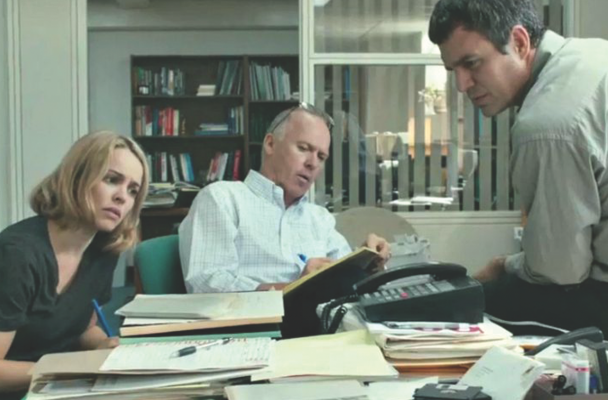‘Spotlight’ illuminates the value of journalism

From left: Rachel McAdams as Sascha Pfeiffer, Michael Keaton as Walter Robinson, and Mark Ruffalo as Michael Rezendes track down a lead in Tom McCarthy’s “Spotlight”. Photo by Newsweek.
By Liz Reichart // A&E Editor
“Based on true events” serves as the harrowing four-word prologue to an increasing number of films, with recent examples including “The Big Short,” “Joy,” “The Danish Girl,” “Straight Outta Compton” and “The Revenant.” A source of credibility that does not limit itself to any one genre, real events have inspired films to be made in everything from horror to slapstick. Despite the transcendence of genre, these films have held the commonality that audiences come to view them because they, in one way or another, want to learn about these events as they happened. Inescapably, the integrity of these situations as they occurred is compromised for good reason: reality is bland. In real life, people use small words instead of soaring Sorkin-esque monologues. Films today are made to entertain and stimulate as much as they are made to educate.
A recent addition to that “based on true events” club is “Spotlight” from director Tom McCarthy (“Up,” “The Station Agent,” “The Visitor”). The film follows the Boston Globe’s investigative crew, the Spotlight team, as the prestigious newspaper gets a new editor in chief, Marty Baron (played by Liev Schreiber). Baron suggests to the Spotlight team, headed by Walter “Robby” Robinson (played by Michael Keaton) that they re-investigate a story about a Boston priest. This first priest was abusing children and the Catholic Church knew, but did nothing. At first, the team is resistant, considering the church was such a powerful force in the Massachusetts capital. But once the Spotlight team, including reporters played by Rachel McAdams and Mark Ruffalo, overturn one stone, a pattern of sexual abuse of children is uncovered. The film details how this pattern reached an extent no one could even imagine, because it was purposefully kept silent in a million different ways. It’s a piece that keeps viewers in the very grips of the reality it paints, but all the while they are asking themselves along with the reporters, “How?”
“Spotlight” may be based on true events, but its cut of any fluff for entertainment’s sake makes it a rarity. With all the feel of a bone-chilling high-stakes thriller and all the accuracy of a documentary, “Spotlight” is the most engaging film to be released this year. The chase feels more action-packed than any Marvel movie, and achieves this without any car explosion or built-up fight to the death. Equally, “Spotlight” puts the “horrifying” back into the horror genre, with each investigative step taken unveiling another shocking reality of a reprehensible cover up. Without a drop of blood, “Spotlight” still promises gruesome monsters. A connect-the-dots game on a real and very serious scale, McCarthy has viewers drawing lines between points and moments later, erasing those lines infuriatingly. The film has the feel of what pure journalism is meant to be: stripped down to its facts with very little editorializing. The most refreshing aspect of “Spotlight” is its deft avoidance of melodrama. It’s an un-romanticized account of old-school journalism – the dissent of the journalists against their superiors, the chasing of sources and the grind of the story at hand. The film resists the lure to lionize its heroes. Each character the audience meets has faults.
Equally as refreshing is the only female reporter on the Spotlight team not being written in a way that is overly sexualized. Reporter Sacha Pfeiffer (played by Rachel McAdams) is an integral part to the Spotlight investigation of child abuse, but doesn’t have to wear tight-fitting clothing or serve as a sidekick to prove her worth.
Just how accurate is the film? The real life leader of the Boston Globe’s Spotlight team, Walter Robinson, says, very. “Most films about journalism don’t get it right. I’m just delighted, as are my colleagues, that this film just nailed it. What we actually did is so accurately and genuinely portrayed in this film, the reporting steps we took, how making the sausage isn’t always a pleasant task to watch, how reporters disagree with one another, how we stumble around in the dark, how sometimes we find the most important things quite by accident. It’s all there, how we make mistakes in our reporting and how we double back, but always and certainly in this case, with the mind, ‘We have to get this story, and we have to get it out.’” Actors spent days shadowing their real-life counterparts. Michael Keaton took Robinson out to dinner to study his hand gestures. “These actors were intent, because they were playing real people, on taking full advantage of the opportunity to get to know us and to play us as we were,” said Robinson.
An understated triumph of the truth in more ways than one, this was a film that needed to be made and furthermore is so deserving of its accolades. So what genre is “Spotlight”? Unlike the Boston Globe itself, the issue isn’t black and white. But when the credits of “Spotlight” begin to roll, the genre falls nothing short of reality.